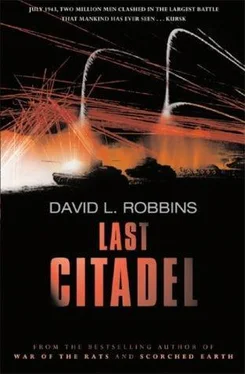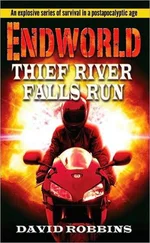Breit computed a ratio of losses per territory gained. In the north, where Colonel General Model fought, German progress had been stopped. Though the fighting was still vicious, there was no longer any way to break through to Kursk out of the north. The Reds had held there. The casualties per kilometer for Model would be enormous, over twelve hundred men for every one of his fifteen kilometers of penetration into the Soviet lines.
Here in the south, only the three SS divisions had made significant headway. Totenkopf, Das Reich , and Leibstandarte fighting together had blazed almost forty kilometers up the Oboyan road. They’d done this against the stiffest Soviet defenses in the whole Kursk salient. Hourly losses for the SS units averaged less than a dozen men and two tanks. Sometimes with quick repairs the tanks were replaced the same day. Not so for the human casualties. The keepers of the map watched the black blocks of II SS Panzer move north along the road, globular and inexorable like water creeping over the map. Each time another Soviet unit was absorbed or shoved aside by an SS division, the mood in the room flared, little bursts of hope, like heat lightning. Abram Breit smoked and stayed apart while Major Grimm and the others clapped and paced, shouting at the table like fans at a cockfight. Soon more news would enter from other dark chambers, from the radio and code rooms, about other units, their dire struggles and failures against the Reds and the costs they were paying. Then the map room would take another long, slow dunk back into the quiet mire of dismay.
This was Citadel, passing through Breit’s hands.
In a calm moment, he wondered about the Spaniard who had left this morning to replace Thoma. For a while he’d thought perhaps young Captain de Vega with his wounds so visible might have been a Lucy contact, secreted somehow to Kursk to keep in touch with their star spy, Breit. The skinny boy was secretive, as silent as Breit himself. The Spaniard had the false look of a man living two lives, with two faces, two everything. Though de Vega proved not to be from Lucy, he was plainly more than what he appeared, a quiet and hurt boy. Breit glanced down at the black block for Leibstandarte beside the Oboyan road, noting the ten kilometers of road de Vega’s division had already captured that afternoon. Breit feared he may have sent out into the battle a fierce one and given him a Tiger tank.
Standing beside the map, Breit handled another page. He did not look up at the face of the messenger who loomed in and out of the gloom ringing the table. The Spaniard had been the only distinct one, the rest were simply staffers. Breit was one of them, too, lean and scholarly, unscarred by battle. He looked at his own white hands holding this latest page, recalled the remarkably thin hands of the Spaniard, and marveled how different a man can be from his appearance.
Breit scanned the report. He expected it to be like the hundred others handed to him today, another mosaic of news in the battle. He lifted a finger to beckon one of the stick bearers, to have the staffer push some block forward, and another one backward. He lowered his hand. Behind him, boots retreated. Breit read the page again, slowly.
Leibstandarte had taken the town of Sukho-Solotino. Another seven kilometers of the Oboyan road had fallen into German hands.
Breit digested the facts on the page, the casualty count, materiel lost, enemy losses, current status and location of division.
One word occurred over and over in the report. It dawned on Breit that this word had stood at the head of every report of every successful action the Germans had mounted since Citadel began.
Tiger.
In the fighting in the north, out of the six hundred tanks in Model’s 11th Army, none were Mark V Panthers and only thirty-one were Mark VI Tigers. Model had not used his few Mark Vis well, he had not put them into the fight at the right times and places. He’d been too cautious, too impressed with the Tigers to spend them. So Model was kaput .
Of the one hundred Tigers assigned to the southern front of the Kursk bulge, fifty-seven served in the three SS divisions and the Grossdeutschland division of 48th Panzer Corps. Every one of those tanks had been used in the battle for the Oboyan road, in the middle of the most brutal combat in all of Citadel.
The Russian T-34s often ran away from the Tigers when they encountered them. Good thing, too, because no single T-34 could ever hope to best a Mark VI in combat. Even so, the Tigers were being lost at an alarming rate, to mines, to misuse, to asking them to do too much, or too little. Right now there were no more than six Tigers total operating in all three SS divisions. But the behemoths were hard to knock out of the fight for good; at night, German mechanics towed the wounded Tigers off the battlefields and often repaired them by morning. The Tigers were a single-minded priority for the SS’s mobile repair stations. Tomorrow, Breit knew, the number of Tigers in the field could double.
The reports in his hands did not lie. Every time a Tiger appeared – in any amount, one to a dozen – and was utilized the way it should be, the battle swayed its way. The map table showed the results, revealing the difference these tanks were making. All three II SS Panzer divisions along with Grossdeutschland , each with Tiger battalions, had ranged far out in front of their flanking units, spearheading the drive to Oboyan and Kursk. Other units without Tigers failed to keep up.
Abram Breit dug fingers into his brow. He should have seen this sooner. But perhaps not, perhaps it took these five days of fighting for the numbers to congeal and this fundamental truth to appear. Perhaps he’d caught it in time. In any event, he knew he was right.
Stop the Tigers, or you will not stop the German offensive.
The Reds had to change their tactics, they had to engage the Tigers at every chance, at any cost. Find them, charge them, and don’t just knock them out. Kill them. Then the Soviets’ numerical advantages can assert themselves. But so long as Tigers stay on the battlefield, because of their power, armor, and their raw reluctance to die, and because they have been given only to crack units, the outcome of Citadel will hang in the balance.
Abram Breit carried in his head something more powerful than any tank, or any weapon at Kursk. He had all the German information for the battle neatly memorized. He possessed the numbers for every SS and Wehrmacht division, their troops, artillery, armor, air power, casualties.
With what he knew, Breit could thwart Citadel.
He called for the stick-bearer now. A tall, bald lad moved forward. The staffer shoved the Reds backward out of Sukho-Solotino, retreating up the Oboyan road. Then he pushed Leibstandarte – and the young Spaniard riding his Tiger – in.
Breit lit another cigarette. He watched the curls of his smoke spread over the battle map.
He stubbed out the butt when he knew what to do.
‘Major.’
‘Yes, Colonel.’ Grimm attended him quickly.
Arrange a flight for me to Berlin.’
Grimm hesitated, baffled. ‘Yes, Colonel. May I ask why?’
‘I need to report to the Führer.’
Major Grimm looked down at the map table, uneasy. Everything seemed in order. What had come up so suddenly that Abram Breit needed to fly back to Berlin to report to Hitler?
Breit handed the page to Grimm. Let the major deduce what he will about Hitler. Breit would concoct something for that madman’s ears, make it sound urgent and vital.
‘Within the hour, Major.’
Abram Breit left the map room.
July 8
2010 hours
Slatino aerodrome
Breit was coated in dust.
Читать дальше












